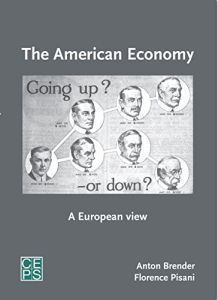Join getAbstract to access the summary!

Join getAbstract to access the summary!
Anton Brender and Florence Pisani
The American Economy
A European View
CEPS, 2018
What's inside?
A European take on American economic history, policies, feats and foibles.
Recommendation
Analyzing the origins of the 2008 US financial crisis and the reasons for the lengthy, sluggish recovery that followed will keep experts busy for a long time. In this discerning albeit scholarly analysis, European economists Anton Brender and Florence Pisani offer an outsider’s view of what makes the American economy tick. They argue that the widely acknowledged precursors to the crisis were predictable from the outset, but they identify the real culprit as unique and long-standing American precepts about limited government intervention in the economy. While the authors’ conclusions are not particularly original, their book excels at giving readers – especially non-Americans – important insights into the sweeping impacts of the US economy.
Summary
About the Authors
Anton Brender and Florence Pisani are both economists with Candriam Investors Group.

















Comment on this summary